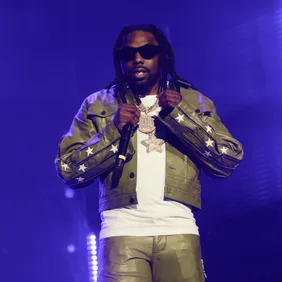DJ Khaled's latest project Father of Asahd is stuck at the midway point of a crossing nearly 15 years in the making. Once again, he finds himself in a relaxed and entirely comfortable position. Over time, Khaled's proven himself to be a masterful curator for the sole reason his black book is kept up to scratch. He's no better than a used car salesman when he oversells us recycled parts.
To understand these persuasive antics, one must travel back in time to the mid-70s during Khaled's childhood upbringing in New Orleans. From an early age, his parents fostered his interest in hip-hop - a culture they would come to learn vicariously once their son had made it. After testing the waters on the local radio circuit for X amount of years, Khaled relocated to Miami - where I gather he developed a keen sense for the "Global Village" of music.
It's entirely possible that Khaled was present when the recording industry underwent a paradigm shift towards digital streaming. Father of Asahd certainly illustrates a need for the residual past to exist right now. But therein lies the issue with many of DJ Khaled's crowd-sourced efforts. The best of us have grown jaded to hearing overly simplistic sample flips. Had it not been for Rihanna's undeniable charisma on "Wild Thoughts" in 2017 would Khaled have managed to retain a near-identical guest list on his next album? I do believe the answer is a begrudged YES, give or take a small number of draft dodgers slipping through the cracks.
With the sacred altar "Maria Maria" all but spent, Khaled did manage to land an unprecedented number of co-production credits on Father of Asahd - including the sacrilegious use of yet another untouchable - OutKast's "Ms. Jackson" put towards the SZA-assisted "Just Us," reducing it to a "lesser bop" with far less conviction than the original. The other high profile guest spots stand on their own merit, for it's hard to imagine seasoned vets like Jay-Z or Rick Ross suddenly losing their touch.
When it comes to Khaled's attempt at re-creating Dancehall - he passes for an expert in the field. He doesn't have much of a choice in the matter. If he doesn't achieve a high watermark with his version, the consumer will look towards the actual Dancehall scene for better alternatives. The Global Village has never been this accessible. On Father of Asahd, Buju Banton contributes in areas where his trembling presence is urgently needed to break the monotony. "Holy Ground" and "Holy Mountain" are second only to "Country For Sale," a single he dropped just over a week ago under the auspices of anti-oppression. In early December, Buju Banton returned to civilian life after serving an 8-year bid for conspiring (not doing) to traffic cocaine. Combine those exploits with what you know of Meek Mill and there's little need for storytelling whatsoever. Whatever Father of Asahd lacks in subject material, it surely makes up for in notoriety.
Why is it that DJ Khaled's albums have next to no replay value? Is it because his underlying motives are driven by consumerism? It's bad enough Asahd was photographed for the cover, and never spoken of again - like a weeping child who loses his father in a giant shopping complex. What's more, if Khaled weren't so endearing, would he not be guilty of Pitbull-levels of austerity on the sample board? It pains me to say it but Khaled produces the type of albums that no one ever dreamt possible, yet never asked for, to begin with.







